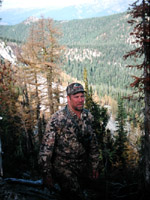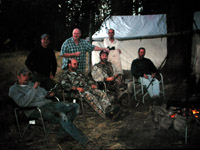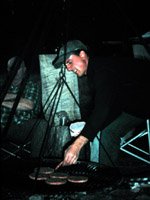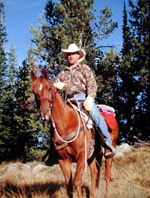
|
Features
|
|
|
|
Books
|
|
|
|
Fun & Games
|
|
|
|
Contact Us
|
|
|
John's Journal... Entry 122, Day 2
ELK HUNTING WITH RENOWNED OUTDOORSMAN, STEVE PUPPE
Selecting Equipment and Finding an Outfitter
 EDITOR'S
NOTE: For the past 25 years, Steve Puppe of Hamilton, Minnesota, a
member of the Mossy Oak Hunt Team, has been very fortunate to gain a wealth
of hunting knowledge and experience which has given him the opportunity
to be featured in several hunting videos and national magazines. He is
known for his public speaking and currently is a co-host of the popular
television series "Outdoor Expeditions" on the Outdoor Channel.
Puppe enjoys sharing his knowledge and experience with hunters -- young
and old alike. This week Puppe will tell us about his experiences hunting
elk and will walk us through some of the most-overlooked steps to elk-hunting
success.
EDITOR'S
NOTE: For the past 25 years, Steve Puppe of Hamilton, Minnesota, a
member of the Mossy Oak Hunt Team, has been very fortunate to gain a wealth
of hunting knowledge and experience which has given him the opportunity
to be featured in several hunting videos and national magazines. He is
known for his public speaking and currently is a co-host of the popular
television series "Outdoor Expeditions" on the Outdoor Channel.
Puppe enjoys sharing his knowledge and experience with hunters -- young
and old alike. This week Puppe will tell us about his experiences hunting
elk and will walk us through some of the most-overlooked steps to elk-hunting
success.
QUESTION: What equipment should a hunter carry to an
elk camp?
ANSWER: A hunter should take the bare necessities: his bow, camouflage,
a backpack and plenty of water. Usually the guide will have the other
equipment that hunters will need, such as a GPS, a map and other secondary
pieces of equipment. The most important items to pack are bottled water
in your backpack and maybe a survival blanket -- particularly if they
get into a situation where someone falls into a river. You never know
what can happen. Cell phones don't work too well out there, unless you
get on top of the mountain. So you need to be prepared.
 QUESTION:
What about high-tech equipment like satellite phones or GPS?
QUESTION:
What about high-tech equipment like satellite phones or GPS?
ANSWER: Most guides carry a GPS. A satellite phone also will work well.
Personally, I carry a GPS and use it for 2 different things. I use my
GPA to mark specific locations if I find a wallow. Or, if I get an elk
down, finding the exact spot again when you get back in those draws can
be difficult. The draws are so big that everything looks the same. But,
I've used a GPS to guide me to within 5 feet of an elk. They're pretty
accurate. The only problem with a GPS is that if you get into some tight
canyons you can't get a satellite position down there. They're not foolproof.
So hunters may want to carry a compass. A compass and a map are probably
more important than a GPS, actually. You also should pack some type of
waterproof bag to keep your map and compass dry.
QUESTION: What should you look for in an elk-hunting
trip? How do you pick an outfitter?
ANSWER: First, I'd ask what kind of success the outfitter has had. Ask
them about the terrain. Tell them about your own physical shape. Your
ability to handle the rough terrain and climb in high elevations may determine
where you want to hunt. Success isn't always measured by the amount of
elk in the area. Most elk-hunting success is based on your physical preparation.
You may have to go for a hike and come back to camp, if you're not prepared.
Ninety percent of the hunters I work with just can't go where the elk
are. Also ask what kind of accommodations the outfitter offers. Determine
the length of the trip and the equipment you'll need to bring. The outfitter
generally will inform you of all the equipment you'll need and what the
guide will carry. Asking for references -- good and bad (or I should say
successful and unsuccessful) -- is also important. Some hunters don't
go home with an animal but still experience a very successful trip. Many
hunters I guide don't bag an elk. You don't have to shoot one to be successful.
Having a good time on your hunt is a big part of the hunting trip and
the overall experience.
 QUESTION:
What charges are usually quoted for a cook or for a wrangler?
QUESTION:
What charges are usually quoted for a cook or for a wrangler?
ANSWER: Most camps include just about everything except meat processing
and tips for your guide and your cook in the price of a hunt. Most outfitters
will get the elk out of camp for you and probably take it to a meat locker.
The locker will process the elk and do the taxidermy work as well.
QUESTION: What about tips; what is generally a good one?
ANSWER: The tips should depend on what kind of hunt you have had of course.
I would say at least $200 to $250 per hunter for a hunting guide. Most
guides work pretty hard. If you get an animal down there's a lot of work
involved. One hunting trip, I spent the better part of 4 or 5 hours maneuvering
on that elk out of the woods. You have to determine how hard the guide
works for you. Some guides don't work as hard as others. Some guides can
go all day long. If the hunter can keep up, the guide will keep going
and going and going.
 QUESTION:
What about the other members of the camp, like the cook?
QUESTION:
What about the other members of the camp, like the cook?
ANSWER: Probably $50 to $100. Everybody runs his or her camp a little
bit different. You have to talk to the outfitter about the camp. In our
camp, we employ a gal who starts the fires every night, makes breakfast,
packs a lunch and then prepares a good dinner at night, like a steak dinner
or stuffed pork chops. We have excellent accommodations.
TOMORROW: BOWHUNTING VS. GUN HUNTING FOR ELK
Check back each day this week for more about Elk Hunting...
Day 1 - How Puppe Became
An Elk-Hunting Guide
Day 2 - Selecting Equipment and Finding an
Outfitter
Day 3 - Bowhunting Versus Gun Hunting For
Elk
Day 4 - How to Hunt Elk
Day 5 - Elk Calls for Beginners